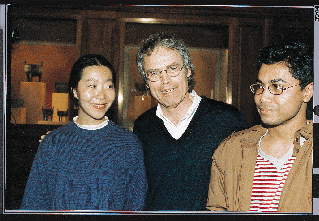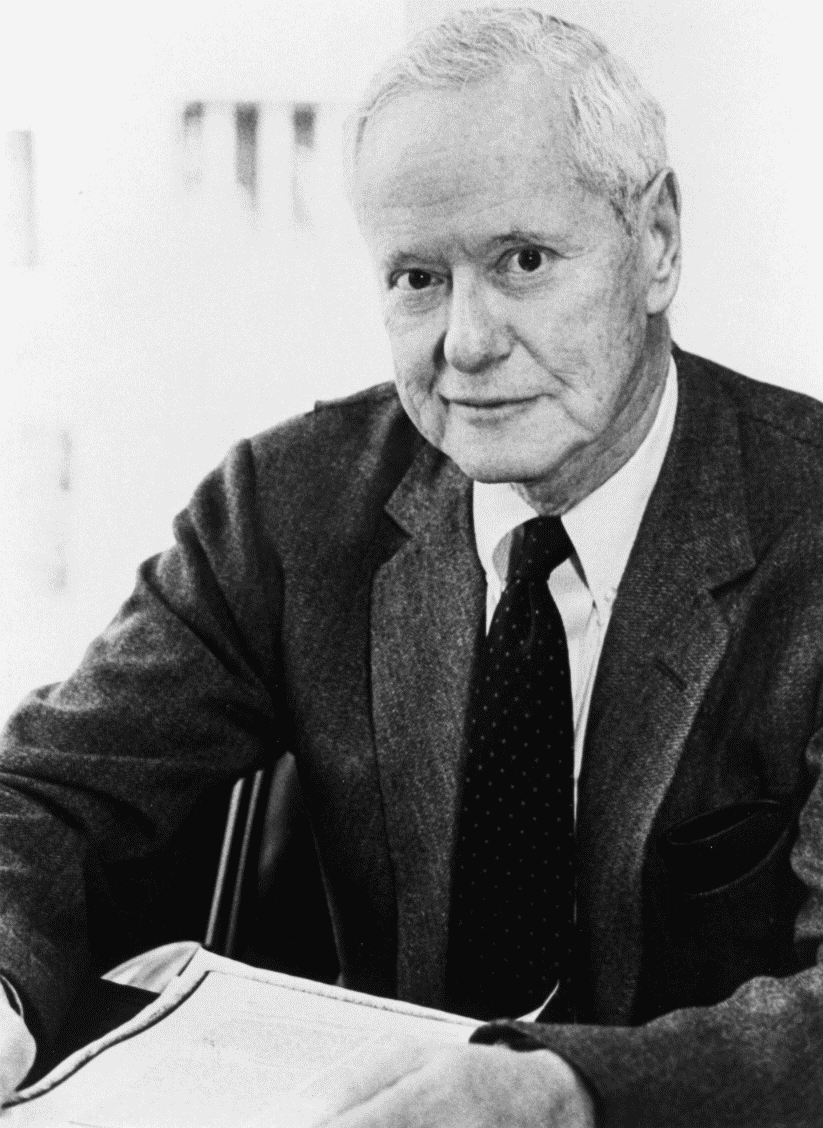
Nobel prize winner Horst Stormer is flanked by admiring
students shortly after his award was announced.
photo: Eileen Barroso

Robert K. Merton Photo: Sandra Still
|
HOORAY FOR HORST: Physics professor
Horst Stormer won the 1998 Nobel Prize for Physics, joining
three other Nobel laureates on the physics faculty and becoming the
59th winner who has attended or taught at Columbia. The German-born
Stormer came to the University a year ago from Lucent
Technologies’ Bell Laboratories, where he made the
prize-winning discovery in 1982 with two other scientists, with
whom he is sharing the prize.
They discovered what is called “fractional quantum Hall
effect,” which has to do with the charge of electrons.
Normally each electron has the same fundamental unit of charge.
These scientists observed that in certain clusterings of electrons,
there can be fractional amounts of that charge rather than a full
one.
Physicists liken the discovery to
that of superconductivity, saying it is the discovery of a new
state of matter. It may revolutionize microelectronics, making
possible smaller and faster computer chips.
This semester, Stormer is teaching
an undergraduate seminar in the physics department. Last semester
he taught an undergraduate seminar in applied physics in the
Engineering school that is required for students majoring in that
field.
“While I made the discovery at
Lucent, I came to Columbia to help bridge the differences between
industry and academia,” Stormer said. “I think we are
succeeding.”
CORE PROFESSORS
HONORED: Professors Edward “Ted” Tayler and Irene Bloom
were presented with the Sixth Annual Distinguished Service to the
Core Curriculum Award on November 12 at the Heyman Center for the
Humanities. Tayler, who is the Lionel Trilling Professor in the
Humanities, developed Logic and Rhetoric, the writing component of
the Core, and has taught the course since 1986. Bloom is the chair
of the University Committee on Asia and the Middle East. Recipients
of the award have demonstrated service to the College community by
chairing one of the Core courses, serving on Core committees,
giving lectures and seminars or publishing articles on the
Core’s contribution to the undergraduate experience. They are
selected by the Administrative Committee of the Heyman
Center.
TREAT FOR TRICK: A Columbia
psychology professor and graduate student are the first to get
monkeys to work with numbers and they believe this shows that the
monkeys are thinking even if they are not using
language.
Professor of Psychology Herbert
Terrace and Elizabeth Brannon, a Columbia graduate
student in psychology, trained two male rhesus monkeys, named
Rosencrantz and Macduff, to arrange pictures of a different number
of objects in ascending order. Up to nine pictures appeared on a
touch-sensitive computer screen, for example a picture of one
triangle, two bananas, three hearts, etc. When the monkeys touched
the randomly placed pictures in the right order, they were rewarded
with banana-flavored pellets.
“It’s like using your password to get money from a cash
machine, but it’s harder for the monkeys,” Terrace
said. “When you go to a cash machine, you don’t have to
deal with the numbers being in strange positions each time. We
don’t have direct evidence yet, but it seems likely that
these monkeys can count.” Professor Terrace, a former student
of B.F. Skinner at Harvard, is known for his experiment in the
mid-1970s in which he taught a chimpanzee, Nim Chimpsky, to use
sign language. Although Chimpsky learned 125 signs, Terrace
concluded that the animal was not using the language to create
unique sentences. The researchers believe that number skills
evolved before human speech, and in continuing the experiments hope
to show that human intelligence can be traced to animal
origins.
The results appeared in the October
23 issue of the journal Science.
ROLE MODEL: Recognized for
originating such common phrases as “self-fulfilling
prophecy,” “role model” and “deviant
behavior,” the Columbia sociologist Robert K. Merton was
recently identified in a New York Times article as “one of
the most influential sociologists, if not one of the most
influential theorists, in America.” The first sociologist to
receive the National Medal of Science Award (in 1994), Merton is
credited with establishing the basic theories of the “ethos
of science.”
HONORED: English professor David
Kastan is the recipient of The Association for Theatre in
Higher Education’s 1998 research award for a book-length
study in theatre practice and pedagogy. The award, which he
received for his A New History of Early English Drama, was
announced during the association’s national conference in San
Antonio in August.
GUEST EDITOR: Eric Foner
’63, the DeWitt Clinton Professor of History and author
of the recently published book, The Story of American
Freedom, was the guest editor of the December 14 issue of The
Nation. Foner and Randall Kennedy, professor of law at Harvard,
edited a special section of essays under the umbrella title
“Reclaiming Integration.” Noting that integration
“has lately fallen into disuse or disfavor,” Foner and
Kennedy wrote that their goal was “to rekindle critical
discussion of integration by examining whether it remains, 30 years
after the end of the civil rights era, a desirable goal and a
viable political strategy.” Among those contributing essays
was Daryl Michael Scott, associate professor of history at
Columbia and author of Contempt and Pity: Social Policy and the
Image of the Damaged Black People, 1880-1996.
|

